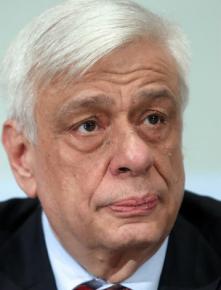A president from the other side
Prokopis Pavlopoulos, a leading figure in the center-right New Democracy party and former Interior Minister under a previous conservative government, was nominated to be president of the Greek republic by Prime Minister Alexis Tsipras and elected to the position by parliament with more than three-quarters of members voting in favor.
Pavlopoulos' election to the largely but not entirely ceremonial post of president represents another deal with conservatives made by the leaders of the Coalition of the Radical Left, or SYRIZA, which won parliamentary elections last month by a wide margin, but fell just short of an outright majority in parliament. The day after the vote, Tsipras announced an agreement with the Independent Greeks, known by the initials ANEL: The right-wing, anti-Memorandum party supports the SYRIZA-led government in parliament, and several of its members hold state positions, including defense minister. Now Tsipras has handed a major governmental position to a member of the main center-right party that led the way in imposing the Memorandum agreement with the European powers to impose harsh austerity measures.
The following article by was published in Workers' Left and republished at the RProject website on February 17. It was written while Pavlopoulos was one of several right-wingers rumored to be candidates for the presidency. Later that day, Tsipras proposed to SYRIZA members of parliament that the party nominate Pavlopoulos--the vote approving him as president took place on February 18.
WHEN THE lenders show their teeth and the EU sends an ultimatum basically requiring the cancellation of the outcome of the January 25 elections won by SYRIZA, it is clear that those who promised an easy settlement with Greece's "partners" in Europe were promoting an illusion. In this circumstance, every action of the government led by SYRIZA becomes important.
The selection of a president of the republic proposed by members of parliament from SYRIZA is not only a highly symbolic move, but one that highlights the strategy to be used in the major challenges ahead.
Choosing a presidential candidate representing the left would increase the confidence of the working class, follow the political message of the January 25 election, and rally a broad popular sentiment in favor of democracy, which the lenders brazenly provoke. SYRIZA would send a clear message on several levels: of its commitment to opposing austerity and confronting both the local ruling class and the demands of the Euro-Atlantic imperialist alliance.

Choosing a president from the center-right or right wing, on the other hand, means the government is placing a priority on finding a compromise with both the domestic and international ruling class. That search for a compromise could erode the public trust for the government that was shown so clearly on January 25.
Panos Kammenos [the founder of the right-wing Independent Greeks (ANEL) who is now defense minister after an agreement to include ANEL in the new government] raised the scenario of a government mainly made up of SYRIZA, but with a president from the center-right. Kammenos even suggested for the role the pope of neoliberalism...Dora Bakoyanni! [a right-wing politician and minister in several New Democracy governments who attempted to win leadership of the party, without success]
It is obvious that such a proposal would convert SYRIZA into a hostage of fragments of the right wing (a combination of ANEL and Bakoyanni or Dimitris Avramopoulos [another New Democracy leader, former minister and a career diplomat] or Prokopis Pavlopoulos [member of parliament for New Democracy from 1996 until 2014 and former Interior Minister]) and make the government vulnerable to being toppled if and when the right wing can reconstitute itself and regain power.
This proposal for a president from the right--in all its variations and from wherever it comes--contradicts (and before even a month has passed!) the depth of the political change that the January 25 elections represent. The people voted for the party of the radical left to topple memorandum austerity, not for an alliance of the center-left-right that could only revive Memorandum austerity with a (supposedly) "human face."
The supporters of such a proposal inside SYRIZA talk about the need for "consensus" in view of the difficulties faced by the government. This is a reversal of the basic experience that has produced success so far. SYRIZA rallied a broad working class and popular "consensus" by putting forward radical left-wing politics.
The opposite policy of seeking a broad consensus through alliances to its right was followed by the Democratic Left, and the results are known today. [The Democratic Left was a split from SYRIZA that participated in the last government led by New Democracy. Its electoral support plunged in the January election--it didn't win enough votes to have a representative in parliament.]
It is worth remembering that the role of the president isn't just symbolic, since the Constitution provides for highly political initiatives such as referring draft laws or convening a council of political leaders. In a political crisis, the president could gain even more powers, meaning that this official would hang like the sword of Damocles over the head of a government of the left that doesn't have 151 seats in parliament.
AFTER THIS article went to press, it became known that Prime Minister Alexis Tsipras proposed to the members of parliament group of SYRIZA--and not the Central Committee or Political Secretariat--that Prokopis Pavlopoulos be nominated for president of the republic.
This proposal is in direct conflict with the decisions of dozens of organizations of SYRIZA members, as well as the Central Committee of the SYRIZA youth organization--all of them rejected the prospect of a Memorandum candidate coming from the right, and proposed a candidate from the left or the broader progressive space.


